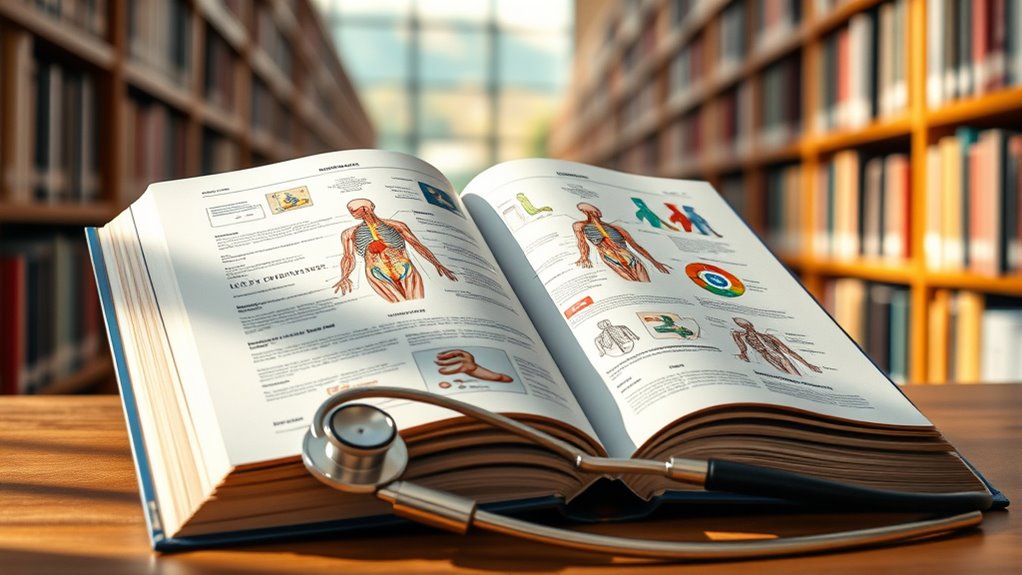
When it comes to your MBBS journey, having the right medicine book can make all the difference. It’s not just about memorizing facts; it’s about understanding complex concepts that will shape your clinical skills. With so many options available, how do you choose the one that best fits your learning style? Let’s explore what you should consider and some recommended titles that can guide you toward success.
Key Takeaways
- “Harrison’s Principles of Internal Medicine” offers comprehensive clinical guidelines essential for MBBS students’ education and practice.
- “Goodman & Gilman’s: The Pharmacological Basis of Therapeutics” provides critical insights into drug mechanisms and therapeutic uses.
- “Robbins and Cotran Pathologic Basis of Disease” is key for understanding disease processes and pathology in medical education.
- “Clinical Medicine” by Kumar and Clark emphasizes practical approaches to patient care, integrating theory with clinical practice.
- Choose books aligning with your learning style and curriculum to enhance your overall medical knowledge and skills.
Importance of Comprehensive Resources in MBBS

While pursuing an MBBS degree, you’ll quickly realize that having access to extensive resources is essential for your success. The importance of thorough resources can’t be overstated. They provide you with valuable insights and knowledge that can enhance your medical education value. You’ll find textbooks, online databases, and journals useful in understanding complex concepts and staying updated with the latest research. These resources help bridge the gap between theoretical knowledge and practical application, making your learning experience more robust. Additionally, they serve as vital tools for exam preparation, ensuring you’re well-equipped to tackle assessments confidently. By leveraging diverse resources, you’ll not only improve your academic performance but also develop a well-rounded understanding of medicine, setting a strong foundation for your future career.
Key Topics Covered in an MBBS Medicine Book

An MBBS medicine book covers a wide array of key topics that are fundamental to your medical education. You’ll explore essential areas, including clinical guidelines and diagnostic criteria that shape patient care. Understanding these principles is vital for effective diagnosis and treatment.
Here’s a glimpse of what you’ll encounter:
| Topic | Description |
|---|---|
| Clinical Guidelines | Evidence-based protocols for treatment |
| Diagnostic Criteria | Standards for accurate disease identification |
| Pharmacology | Drug mechanisms and therapeutic uses |
These topics not only prepare you for exams but also equip you with the knowledge to handle real-world medical scenarios. Mastering them will enhance your clinical skills and patient interactions throughout your career.
Simplifying Complex Medical Concepts

Understanding complex medical concepts can be challenging, but you can make it easier with a few effective strategies. Using visual learning techniques, mnemonic devices, and real-life case studies can help you grasp and retain information better. Let’s explore how these tools can enhance your learning experience in medicine.
Visual Learning Techniques
Visual learning techniques play an essential role in simplifying complex medical concepts, making them more accessible and easier to grasp. By using visual aids like charts, infographics, and videos, you can enhance your understanding greatly. These tools break down intricate information into digestible pieces. Interactive diagrams, for instance, allow you to engage with the material actively. Instead of just reading about anatomical structures, you can manipulate 3D models to see how they function in real time. This hands-on approach not only reinforces your learning but also helps you retain information longer. Embrace these techniques to transform difficult topics into clear, visual representations, ensuring you’re well-prepared for exams and practical applications in your medical career.
Mnemonic Devices Usage
Using mnemonic devices can greatly enhance your ability to memorize complex medical information. These memory aids simplify intricate concepts, making them easier to recall during exams or clinical practice. You can use various mnemonic techniques, like acronyms or visualization, to help solidify your knowledge.
Here’s a quick reference table to illustrate some popular mnemonics:
| Mnemonic | Meaning | Example |
|---|---|---|
| ABCDE | Skin cancer assessment | Asymmetry, Border, Color, Diameter, Evolving |
| SOAP | Patient note structure | Subjective, Objective, Assessment, Plan |
| RICE | Injury treatment | Rest, Ice, Compression, Elevation |
| OPQRST | Pain assessment | Onset, Provocation, Quality, Radiation, Severity, Time |
| FAST | Stroke recognition | Face drooping, Arm weakness, Speech difficulties, Time to call 911 |
Real-life Case Studies
Real-life case studies can illuminate complex medical concepts, making them more relatable and easier to grasp. By examining a patient’s journey, you can see how clinical reasoning comes into play and influences diagnostic decisions. For instance, consider a case where a patient presents with atypical chest pain. Analyzing their history and symptoms helps you connect the dots, guiding you to a diagnosis of a rare condition. This process not only sharpens your skills but also emphasizes the importance of thorough evaluation. Ultimately, these case studies show you how effective clinical reasoning can lead to improved patient outcomes. By learning from real situations, you can better prepare yourself for the challenges of clinical practice.
Case Studies and Practical Applications

Case studies and practical applications are essential tools in medical education, providing you with the opportunity to bridge theoretical knowledge and real-world scenarios. Engaging in case analysis helps you develop critical clinical reasoning skills, allowing you to diagnose and treat patients effectively. By examining various patient cases, you’ll learn to identify symptoms, consider differential diagnoses, and formulate treatment plans. These experiences enhance your understanding of disease processes and improve your ability to apply theoretical concepts in practice. Additionally, discussing case studies with peers and instructors fosters collaborative learning and deepens your insights. Ultimately, incorporating these practical applications into your studies prepares you for the complexities of clinical practice, ensuring you’re better equipped for your future as a healthcare professional.
Tips for Effective Study Strategies

To succeed in your MBBS studies, mastering effective strategies is key. You can enhance your learning through active recall techniques, manage your time wisely, and take advantage of group study sessions. Let’s explore how these methods can boost your understanding and retention of medical concepts.
Active Recall Techniques
Although studying for your MBBS can feel overwhelming, incorporating active recall techniques can greatly enhance your retention and understanding of complex medical concepts. Instead of passively reading your notes, try to actively retrieve information from memory. This can be done by testing yourself with flashcards or practice questions. When you recall information, it strengthens your neural pathways, making it easier to remember later. Combine this with spaced repetition—reviewing material at increasing intervals—to further boost your memory retention. For instance, revisit a topic after one day, then again after a week. This method prevents cramming and guarantees that you retain knowledge long-term. By consistently using active recall and spaced repetition, you’ll become more confident and effective in your studies.
Time Management Skills
Mastering time management skills is essential for your success in MBBS studies, as it allows you to balance coursework, clinical practice, and personal life effectively. Start by implementing effective scheduling techniques; create a weekly planner to allocate specific time blocks for studying, attending classes, and engaging in clinical rotations. Make sure to review this schedule regularly and adjust as needed. Next, use prioritization techniques to identify high-impact tasks. Focus on what’s urgent and important, tackling those subjects first. Break larger tasks into smaller, manageable chunks, making them less overwhelming. Finally, set achievable goals each day to maintain motivation and track your progress. With these strategies, you’ll optimize your time and enhance your overall learning experience in medical school.
Group Study Benefits
When you engage in group study sessions, you tap into a wealth of knowledge and diverse perspectives that can enhance your understanding of complex medical concepts. Collaborative learning allows you to discuss topics with peers, helping to clarify doubts and reinforce what you’ve learned. By sharing your insights and experiences, you’re not just absorbing information; you’re actively contributing to a richer learning environment.
To make the most of your group study, establish clear goals and assign roles based on each member’s strengths. Keep discussions focused and encourage everyone to participate. Use visual aids and practice questions to solidify knowledge. Remember, knowledge sharing in a supportive group can lead to deeper comprehension and retention, making your medical studies more effective and enjoyable.
Recommended Medicine Books for MBBS Students

As you commence your MBBS journey, selecting the right medicine books can greatly enhance your understanding and retention of critical concepts. A few standout recommendations include “Harrison’s Principles of Internal Medicine,” which provides thorough clinical guidelines and a solid foundation in various medical fields. For pharmacology principles, “Goodman & Gilman’s: The Pharmacological Basis of Therapeutics” is invaluable, offering detailed insights into drug mechanisms and interactions. “Robbins and Cotran Pathologic Basis of Disease” is another must-have, helping you grasp the pathology behind diseases. Finally, consider “Clinical Medicine” by Kumar and Clark for its practical approach to daily clinical practice. These books will equip you with the knowledge necessary to excel in your medical studies and future practice.
How to Choose the Right Medicine Book for Your Needs

How can you guarantee you choose the right medicine book for your needs? Start by evaluating your learning style. Are you someone who prefers visual aids or detailed texts? Choosing formats that align with your preferences can make studying more effective. Next, consider the author’s credibility. Look for books written by respected experts in the field; their experience will add value to your understanding. Additionally, check reviews and recommendations from peers or professors to confirm the book’s relevance and accuracy. Finally, don’t forget to evaluate how well the content aligns with your curriculum. By focusing on these aspects, you’ll find a medicine book that truly meets your needs and enhances your learning experience.



